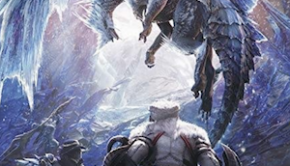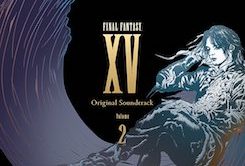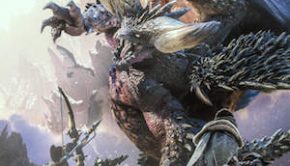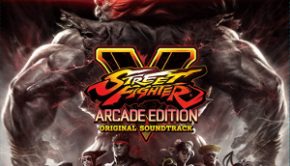Mega Man Battle Network 5DS / 6 Complete Music Collection
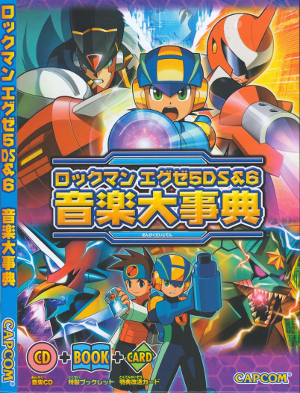 |
Album Title: Mega Man Battle Network 5DS / 6 Complete Music Collection (Rockman EXE 5DS & 6 Complete Music Encyclopedia) |
| Record Label: Suleputer |
|
| Catalog No.: CPCA-10136 |
|
| Release Date: March 30, 2006 |
|
| Purchase: Buy Used Copy |
Overview
Capcom brought the Mega Man Battle Network series to a fairly disappointing close in 2005 with Mega Man Battle Network 6 for the Game Boy Advance. This didn’t stop Yoshino Aoki, however, from creating an excellent soundtrack that ranks as the series’ joint best alongside Mega Man Battle Network 3. This one-disc album features the score for this game, along with the tracks written for the DS port of the fifth game and a trio of bonus tracks. Priced at a reasonable 1500 JPY, this album also comes with a book containing character stories and illustrations.
Body
Mega Man Battle Network 6‘s soundtrack is about as action-packed as its predecessor thanks to its focus on battle and stage themes. Despite its uninspired title, “Battle Field” brings plenty of fresh melodies and ideas to the series’ battle themes while maintaining the energy and attitude of the wider series. The boss theme “Surge of Power!” represents another first for the series, since Aoki embellishes the edgy, distorted chiptune sounds with overdriven electric guitars. Once again, the composer ensures that the notorious sound limitations of the Game Boy Advance do not compromise this track and instead give it a distinct lo-fi personality. Other welcome additions include the action-packed stage themes “Break the Storm” and “Blast Speed”. The latter, featured in BlastMan’s stage, particularly stands out because Aoki chose to blend the standard chiptune elements with noise and sound effects. While this could have been an annoying gimmick in a lesser composer’s hands, it works very well here to give the theme some bite both in and out of context.
Beyond the action tracks, there’s a lot to love in Mega Man Battle Network 6. “Theme of Rockman EXE6” builds on the core elements of her previous two scores for the series with fearless melodies, exhilarating chiptunes, and electronic arpeggios. “Central Town” is another one of those strolling tracks filled with the charm of 8-bit RPGs. Demonstrating once more that she still has passion for the series, Aoki not only ensures the core elements of this track are solid, but also embellishes them with all sorts of cheeky countermelodies. “Navi Customiser” is one of the series’ best, blending original and reprised melodies into a densely lyrical tune, while the Internet theme “Digital Strider” manages a nice blend of ambient and motive elements. Further testaments to Aoki’s charm as a melodist include “Aquarium Question”, “Saiba Academy”, “Seaside Town”, and “Sky Town”/ Along the way, there are event themes such as the mysterious “Organization” and mellow “Indoors” but even these have quite a bit of personality. Aoki also goes all-out to ensure the climax of the score is an impressive one, with the brooding scene-setter “Secret Base”, the motivating anthem “Two of Braves”, and the surprisingly twisted final battle theme “Cyber Beasts!”. To tie up the series, she cleverly blends the series’ main theme with the game’s own theme into the two ending themes.
Following these highs, unfortunately the soundtrack for Mega Man Battle Network 5 DS proves to be simply an atrocity. Mitsuhito Takano and Seiko Kobuchi remixed 13 themes from the original version of the game’s score, as well as the wider series, using more modern approaches. With the exception of the half-decent remix of the main theme, most of the other tracks stray away from the series’ chiptune basis in favour of generic acoustic/electronic styles and samples that could have been used in an any other soundtrack. While “End City” features more realistic wind samples than its original version, the composition sounds less balanced and rich than its original. The cheesy candypop remixes of “Hometown” and “Oral Island” shift the series’ inspirations from 8-bit NES soundtracks to generic dating sims, while the battle theme arrangements “A Total War” and “VS. Nebula Gray” lack the energetic pacing and texturing of the originals. A novelty of the soundtrack is that it features remixes of all six of the series’ main battle themes depending on which of the series’ games you play in the DS’ GBA slot. However, they’re universally disgraceful with ultra-cheesy technopop beats and orch hits. Based on this soundtrack, it is very fortunate that the main games of the series stuck to the Game Boy Advance, as its limitations encouraged the development team to adopt chiptune sounds instead of palely imitating the traditional RPG soundtracks of the day.
An exclusive of this album is “The Count -crossover ver.-“. Featured as part of Mega Man Battle Network 6‘s score, it remixes music from Konami’s Boktai series for the game’s crossover with the title. The end result is a frenzied action track that not all listeners will enjoy. The soundtrack closes with a trio of bonus tracks also featured on the series’ box set. There’s an electronic remix of the game’s main theme used for its Tokyo Game Show trailer and, better still, a dark ambient version of “Digital Strider” by Resident Evil’s Shusaku Uchiyama. A more quaint addition is “Past & Future”, a pop ballad featuring performances from staff of the Battle Network series. While Aoki’s own backing vocals prove quite enjoyable, the lead performance from series’ scenario writer Masakazu Eguchi is awful in every way. While some will find the final track nostalgic, it will be too sentimental and cheesy for most listeners’ tastes.
Summary
There is still a lot to like about this album. Sure, the Mega Man Battle Network 5 DS soundtrack is terrible and the bonus tracks are average. However, Mega Man Battle Network 6‘s soundtrack proves to be the series’ biggest to date, spanning some 45 minutes, and it’s also remarkably its most innovative and balanced. Yoshino Aoki did a great job keeping the music for this instalment fresh while paying homage to the wider series. This score alone makes the album worth its pretty modest pricetag if you can still track it down. Even though it’s the final soundtrack in the series, it’s also an excellent one to start with. However, those willing to splurge might also wish to consider the Mega Man Battle Network Sound Box, which features nearly all the music (except the Boktai crossover) as well as five other discs of varying quality.
Do you agree with the review and score? Let us know in the comments below!
3.5
Posted on July 19, 2016 by Chris Greening. Last modified on July 19, 2016.

